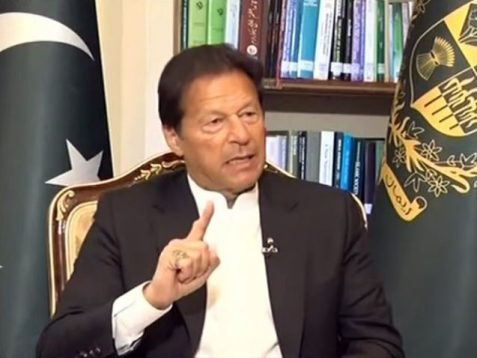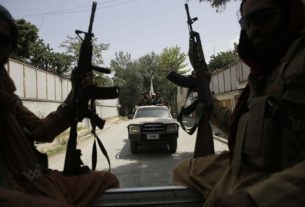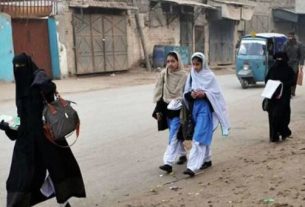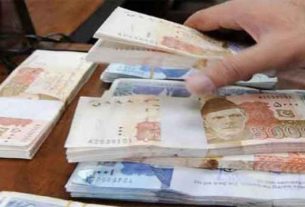Hans J. Morgenthau, a renowned international relations theorist, wrote in his path breaking book Politics Among Nations that: “All politics is power politics.” He was right insofar as he was representing the realist school of thought in international relations, but Morgenthau’s insight also fits politics in 2023, which is devoid of ethics and morality because it is used as a tool to grab power by all means.
The ugliest face of Pakistan’s power politics is a sad reality, as never in the 75-year history of this country has indifference, hypocrisy and opportunism reigned supreme with only a few muted voices of dissent. The lust for power tends to permeate different segments of state and society to the extent that the line between right and wrong doesn’t exist anymore.
The recent example of the ugliness in Pakistan’s power politics is political engineering and manipulation in Gilgit-Baltistan (GB), where Chief Minister Khalid Khursheed of the Pakistan Tehreek-e-Insaf (PTI) had to step down because of a fake degree case. Rawalpindi and Islamabad are on one page for denying PTI any space, which led to police action in the assembly of GB by preventing PTI assembly members in electing a successor to Khursheed.
Following the footsteps of Azad Kashmir, where recently the PTI government was removed by an engineered vote of no-confidence, the situation in GB is getting serious. To break the clear majority of PTI members in GB assembly, the PDM-led coalition government and their patrons in the establishment are now deploying horse trading, harassment and other manipulation tactics to transform the PTI’s majority in the GB assembly into a minority, and then install a coalition government led by the Pakistan Peoples Party (PPP), the Pakistan Muslim League-Nawaz (PML-N) and the Jamiat Ulema-e-Islam (JUI).
When one talks about the malice in Pakistan’s power politics in the year 2023, coercion, repression, oppression and the use of force to suppress the voices of dissent have enabled the powers that be to silence the media and preventing the truth from reach people. The manner in which the judiciary is in a compromising position is unprecedented in 2023, because of a fear that adhering to the rule of law and accountability will damage their interests. Those who are determined to cut PTI and Imran Khan down to size believe that this task cannot be accomplished without silencing the media, judiciary, election commission and conducting a large scale crackdown.
Recently, the Indian Prime Minister Narendra Modi claimed that “Pakistan is not an issue because that country will collapse under its own weight.” Our country’s leadership does not realize that such bluster must be taken seriously. The current economic and political predicament that Pakistan finds itself in is not far from the trajectory that the Indian Prime Minister was predicting for our collective future.
What is appalling in the is the manner in which the majority of political parties have compromised on the principles of democracy, the freedom of press and the independence of the judiciary. When the suppression of dissent is done with the collusion of political parties for consolidating power, the outcome will necessarily be disastrous for the economy and politics of the country.
Why is this ugly power politics allowed to continue, and how are those who wield real power oblivious to the heavy price that Pakistan will pay if the freedom of the media and the independence of the judiciary is compromised? What will be the end result of the current state repression against a single political party and its leadership?
When the history of Pakistan will be recorded, the years 2022 and 2023 will be marked as one of the darkest episodes because the callousness with which ethics, morality and principles were sacrificed for securing power for the ruling coalition government and their principal backers. The implications of adopting such a shortsighted approach by the incumbents will surpass the tragedy of Pakistan’s disintegration in 1971.
Recently, the Indian Prime Minister Narendra Modi claimed that “Pakistan is not an issue because that country will collapse under its own weight.” Our country’s leadership does not realize that such bluster must be taken seriously. The current economic and political predicament that Pakistan finds itself in is not far from the trajectory that the Indian Prime Minister was predicting for our collective future. When the country is facing an unprecedented crisis in its history, instead of dealing with the diplomatic sleight visited on Pakistan by India, over accusations of sponsoring cross border terrorism in a joint communiqué issued by India and the United States, following Modi’s visit to America, the PDM, PPP and the military establishment failed to respond to a grave threat to the country’s national security.
When political engineering led to regime change in AJK and a similar strategy is being pursued in GB, will India remain silent and not fully exploit the situation to their benefit?
The developing political situation in GB, where India is trying to annex what it calls “Pakistan Occupied Kashmir,” will further a valuable opportunity to our neighbor for their designs because of Islamabad’s machinations to remove the PTI government and replace it with their own. One only needs to refer to repeated threats from the Indian Defense Minister in which he has vowed to annex GB and Azad Kashmir by taking advantage of Pakistan’s economic and political crisis.
When political engineering led to regime change in AJK and a similar strategy is being pursued in GB, will India remain silent and not fully exploit the situation to their benefit? Given the sensitivity of GB, because of its strategic and security vulnerability, why has Islamabad embarked on measures to destabilize the situation in that region by attempting to remove the PTI government in Gilgit from power?
Pakistan’s power politics need to be examined from three angles. First, the unholy alliance of the PDM and PPP had a single point agenda – to remove the PTI and Imran Khan from the political scene. Ironically, these political parties failed to learn lessons from history, that alliances based on opportunism cannot endure. But what is unfortunate and alarming is the total neglect of ethics, values, morality and principles by compromising on democratic norms, political tolerance and the rule of law. Using the unfortunate events of 9 May for their own power ambitions and silencing the opposition by imposing curbs on media; neutralizing judiciary and resorting to worst kind of repression will have far reaching implications.
By denying the PTI media coverage and deploying brutal repression through the state apparatus, the coalition government is unable to redeem itself of the consequences of what it is resorting to today by eliminating its political adversary. A myopic mindset on part of those who wield power is unprecedented. Without giving an opportunity to Imran Khan and PTI to defend their position over the sad events of 9 May, those who are determined and single-minded in accomplishing their objectives sooner or later will have to pay the heavy price of their short-sighted approach.
Second, instead of pursuing an inclusive approach to focus on national unity and saving the country from economic derailment, the PDM and their allies are least interested in dealing with issues which will cause unprecedented damage to the country. The ruling coalition’s decisions to use the events of May 9 for their political motives will further divide and polarize Pakistan.
If the next elections are held without the PTI being able to participate meaningfully, and having been denied political space, the credibility of such polls will be doubtful and lead to large scale political conflict and perhaps even violence.
If the PDM and PPP, through denying the PTI a level playing field in the general elections, think that they will fill the gap and secure electoral gains, they are completely mistaken in their calculations. If the next elections are held without the PTI being able to participate meaningfully, and having been denied political space, the credibility of such polls will be doubtful and lead to large scale political conflict and perhaps even violence. Those who are rendering support to the coalition government because of their hatred against Imran Khan by manipulating the next general elections must think very carefully about the consequences.
Finally, the horrid nature of power politics in Pakistan will lead a descent into chaos if partisan caretaker governments are installed in the center and provinces. Already, the legality of caretaker governments in Punjab and Khyber Pakhtunkhwa is contested. Meetings in Dubai and elsewhere between the PPP and PML-N leadership over installing a favorable caretaker setup in the country will be reprehensible, with grave consequences to come.
When the PDM-led coalition government and their principal handlers are unable to neutralize the popular support of PTI among the masses, they embarked on another plan to destabilize GB via political engineering. Anti-Pakistan and anti-establishment sentiments among the local people of GB will trigger another crisis and motivate people like Rajnath and others in India who are waiting for just the right opportunity to absorb GB and AJK into the territorial fold of India.
The dirty game of power politics in Pakistan has further exposed the elites of this country as malicious rent-seeking parasites, who while disregarding the severe economic predicament of the masses, are more interested in operating from their comfort zones and seeking to maximize their privileges and perks even as the country burns. The use of manipulative methods to seek electoral legitimacy will further compound Pakistan’s political and economic crisis.__The Friday Times





